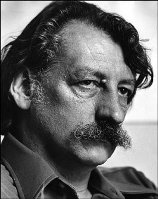Louis R. Harlan, 87; Pulitzer-Winning Historian Of Race Relations
January 29, 2010

By Matt Schudel, Washington PostPublished Friday, January 29, 2010 Louis R. Harlan, 87, a Pulitzer Prize-winning historian at the University of Maryland whose two-volume biography of Booker T. Washington made him one of the nation's foremost...
By Matt Schudel, Washington PostPublished Friday, January 29, 2010
Louis R. Harlan, 87, a Pulitzer Prize-winning historian at the University of Maryland whose two-volume biography of Booker T. Washington made him one of the nation's foremost scholars of the history of race relations, died Jan. 22 at a nursing facility in Lexington, Va. He had Crohn's disease, a chronic digestive disorder.
Dr. Harlan, who taught at Maryland for more than 25 years, devoted much of his scholarly career to Washington, who was born into slavery in Virginia in 1856, led the Tuskegee Institute in Alabama and was perhaps the country's most prominent black leader at the start of the 20th century.
The first volume of Dr. Harlan's biography, "Booker T. Washington: The Making of a Black Leader, 1856-1901," came out in 1972 and was awarded the Bancroft Prize, the most prestigious annual honor in the field of American history. After the second volume, "Booker T. Washington: The Wizard of Tuskegee, 1901-1915" was published in 1983, Dr. Harlan won the Pulitzer Prize for biography, a second Bancroft Prize and the Albert J. Beveridge Award for the best book on American history.
His monumental study covered more than just the life of a single man, albeit a significant and complex one. Historians saw the two-part biography as a beautifully written portrait of black American life during the nation's darkest days of segregation.
C. Vann Woodward, who was often called the dean of Southern history and who taught Dr. Harlan in graduate school, wrote in the New York Times in 1983: "In a review of the first volume of this superb work of scholarship more than 10 years ago, I wrote, 'If the second volume measures up to the first, Harlan's biography of Booker Washington will be the best study we have of a black American.' It is."
Dr. Harlan delved into more than 1 million archival items in the Library of Congress to compile his biography and the 14-volume "Booker T. Washington Papers" (1972-1988). Raymond W. Smock, who helped edit the papers and last year published a short biography of Washington, said of his onetime mentor: "By any definition of the term, he was one of the leading historians of the 20th century."
During the early years of the civil rights movement, when Dr. Harlan began his research, the study of Booker T. Washington was not a popular subject. When Jim Crow laws were prevalent and lynchings were common, Washington championed a non-confrontational approach to race relations, maintaining that hard work and self-reliance would improve the lot of black Americans. He fell into disfavor among a later generation of black leaders, many of whom thought he was too willing make accommodations with white authority.
Dr. Harlan made the case that Washington was a deeply complicated man. "Washington's life and thought were layered into public, private, and secret," Dr. Harlan wrote, "and also segmented according to which subgroup of black or white he confronted. For each role, he wore a different mask."
Among Washington's 14 volumes of writings, Dr. Harlan wrote, there was "not a single love letter, not a cry of joy."
Louis Rudolph Harlan was born July 13, 1922, in West Point, Miss., and grew up in Decatur, Ga. He was on the swimming team at Atlanta's Emory University, from which he graduated in 1943.
During World War II, he was a Navy officer aboard a landing craft that transported troops to Omaha Beach on D-Day. He wrote a memoir of his Navy years in 1996, "All at Sea: Coming of Age in World War II."
He received a master's degree in history in 1948 from Vanderbilt University in Nashville and a doctorate in history in 1955 from Johns Hopkins University, where his mentor was Woodward.
As a white Southerner, Dr. Harlan might not have seemed a likely candidate to write the biography of a black leader. But as a graduate student, he met John Hope Franklin, an African American historian then at Howard University, who encouraged the young scholar to study the history of race relations in the South. Dr. Harlan's first book, "Separate and Unequal" (1958), explored racial inequities in Southern schools.
He joined the NAACP in the 1950s, held leadership posts in the American Civil Liberties Union and participated in civil rights marches in Washington and Montgomery, Ala., with the Rev. Martin Luther King Jr.
Dr. Harlan taught at what is now Texas A&M University at Commerce and the University of Cincinnati before joining the Maryland faculty in 1966. In 1985, he was named a distinguished university professor, U-Md.'s highest faculty honor. He was the first person to be president of all three major scholarly organizations in his field -- the American Historical Association, Organization of American Historians and Southern Historical Association -- at the same time.
Dr. Harlan cut a striking figure on campus with his weathered face and a bushy mustache that made him look like Wild Bill Hickok. He once shaved it off, his wife said Thursday, but she didn't recognize him and asked him to grow it back. He retired in 1992 and moved to Virginia in 2000.
Survivors include his wife of 62 years, Sadie Morton Harlan of Lexington; two sons, Louis K. Harlan of Ronceverte, W.Va., and Benjamin W. Harlan of Secondcreek, W.Va.; a sister; and a grandson.
Of all the lessons to be learned from history, Dr. Harlan said, the most important may be this: "The wisdom of one era is the foolishness of another."
Read the original article here.

